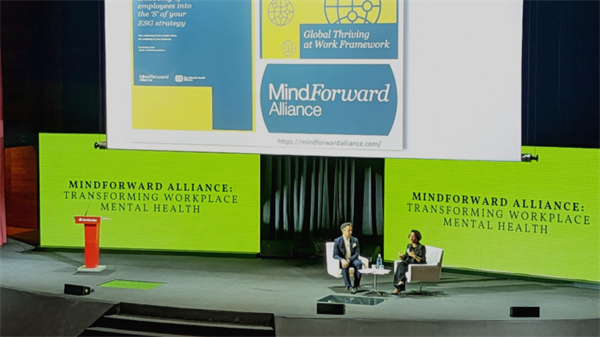As we mark another World Mental Health Day, the global mental health crisis is showing no signs of abating, with one in two people worldwide expected to develop a mental health disorder in their lifetime. We know that this crisis not only devastates individuals and their families but also significantly impacts – and impacted by – the world of work.
The theme for this year’s WMHD is “It’s time to prioritise workplace mental health”. And I welcome shining further light on what is an enormous opportunity for people, businesses, the economy and a society as a whole.
Our MindForward Alliance survey of over 12,000 workers from 12 countries that poor mental health reduces an individual’s motivation and productivity, while increasing their desire to quit their job. It also pointed to high employee’s high expectations - 73% of workers feel that it’s extremely or very important for employers to prioritise the mental health of their workforce. Meanwhile, there is a growing evidence base that prioritising employee wellbeing has huge payoffs for the business too - analysis of US publicly-traded companies shows a strong correlation between employee wellbeing and key performance indicators like firm value, return on assets, and gross profitability.
There are more organisations worldwide which recognise their responsibility to their people, as well as the opportunity for their business. When MindForward Alliance started our journey 12 years ago, almost every business was terrified to acknowledge that they had employees who might have poor mental health. Now many thousands around the world are working to challenge stigma, encourage supportive conversations within their workforce and signpost and offer wellbeing support to employees and measure success. So, today, I am reflecting on the enormous amount of progress has been made on workplace mental wellbeing. But also recognise that there is so much further to go.
There is no quick fix for building mentally healthy organisations. And I know that some businesses are not sure about the most effective path forward. What research and the experience of business tells us that organisations need to adopt a sustained, holistic approach. This involves focusing on three areas:
- Creating a culture of wellbeing and psychological safety: This involves the business being clear that it is prioritising mental wellbeing for everyone and challenging stigma.
- Developing a mentally healthy working environment: Ensuring good working conditions, positive relationships at work and enabling a work-life balance.
- Providing and signposting to mental health resources and services : Organisations should provide access to support that keeps employees them well and assists them when needed.
A crucial factor across all of this is leadership. Business leaders must actively engage and sponsor workplace wellbeing efforts. This is not something that can be wholly outsourced to HR and wellbeing teams and employee resource groups – it involves business transformation.
I’m grateful to and energised by those leaders who are already driving forward change. And I call on other leaders to approach the challenge of poor mental health with the same strategic mindset that they would apply to any major threat to their organisation’s success. Better mental health means increased productivity and stronger economies. And, on a human level, with 60% of the world’s population in work, it will go a long way to helping to address the mental health crisis that we face.
For those ready to take action, a great starting point is downloading our new Thriving At Work Framework, developed in collaboration with the World Wellbeing Movement. It’s a roadmap to help businesses build mentally healthy workplaces: Thriving at Work Framework
When we get this right, the positive impact on people, businesses and society will be immense.





